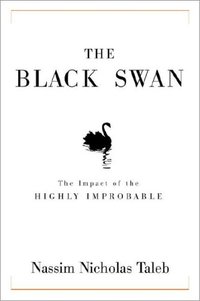 Source of book image: http://store.43folders.com/books-3-1400063515-The_Black_Swan_The_Impact_of_the_Highly_Improbable
Source of book image: http://store.43folders.com/books-3-1400063515-The_Black_Swan_The_Impact_of_the_Highly_Improbable
This is part entertaining rant and part serious epistemology. I’ve finished 9 of 19 chapters so far–almost all of my reading time spent smiling.
Historians of Greek philosophy used to tell the story of one of the first philosophers, Thales of Miletus, that he once was watching the stars, and fell into a well. The citizens of Miletus made fun of him being an impractical philosopher. To prove them wrong, he used his knowledge to corner the market in something, and made a fortune.
Not a very plausible story, but appealing to us philosophers. (Like Thales, we like to think we could all be rich, if we didn’t have higher goals.)
Well apparently Taleb is the real Thales. He wanted to be a philosopher, got rich on Wall Street using his epistemological insights, and is now using his wealth to finance his musings on whatever he cares to muse on.
Beautiful!
Here’s an amusing sentence that broadened my grin. (It was even more amusing, and profound, in context, but I don’t have time to type in the context for you.)
(p. 87) If you are a researcher, you will have to publish inconsequential articles in "prestigious" publications so that others say hello to you once in a while when you run into them at conferences.
Reference for the book:
Taleb, Nassim Nicholas. The Black Swan: The Impact of the Highly Improbable. New York: Random House, 2007.
